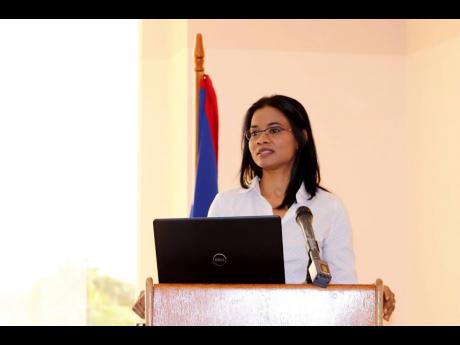Southern Belize communities access research benefits for disaster preparedness
ELEVEN COMMUNITIES in southern Belize now have data on how climate change and disasters could impact their livelihoods.
This is thanks to a weeklong workshop organised by the Community Disaster Risk Reduction Fund (CDRRF) of the Caribbean Development Bank (CDB) in collaboration with the Ministry of Labour, Local Government and Rural Development, Belize, and the Social Development Commission, Jamaica.
“We recognise our vulnerability to natural hazard events and the impacts of climate change. We also know that we can be proactive and take actions to build the resilience of our people and the ecosystems of Belize to the potential impacts,” said Sharon Young, chief executive officer of Belize’s Ministry of Labour, Local Government and Rural Development at the start of the workshop in October.
“To this end, the Government continues to pursue efforts to streamline and institutionalise community profile assessments and inventory, damage and loss data collection and reporting systems across ministries for all severities of events, improve availability of data on losses from disaster. We also want to improve inventorying of public assets and explore practical funding mechanisms to support our preparedness and recovery efforts,” she told the roughly 30 workshop participants from Belize, St Vincent and the Grenadines, and Jamaica.
The workshop was held in Punta Gorda from October 7 to 11.
The fieldwork for the Community Profiles and Livelihood Baseline Assessment Workshop focused on the villages targeted by the Building Adaptive Capacity and Resilience to Climate Change in Toledo, Southern Belize Project, which is being implemented by Humana People to People Belize. The CDRRF of the CDB provided funding for the project.
The workshop saw participants heading into the communities of Bella Vista, Bladen, Corazon, Santa Ana, and San Benito Poite to collect baseline information and do reporting on climate change and disaster impacts on livelihoods for two days. The last two days were spent writing the reports from the data collection.
This workshop is a follow-up to one held in March, where data for the baseline assessment collected and draft reports were completed for six villages: Trio, Golden Stream, Indian Creek, Jordan, Blue Creek, and Santa Theresa.
“Our objective at the end of the week was to complete the 11 profiles for the villages. It seemed like an impossible target; however, as demonstrated by the community-development agencies in St Vincent and the Grenadines and Jamaica, it is doable,” said Claudia James, project Manager for the CDRRF.
Both James and Young noted the value of the data collected.
According to Young, the baseline information on areas and populations, including vulnerable groups likely to be impacted by disasters, would be kept updated because it is an essential part of national disaster preparedness.
“Our vulnerability to natural disasters and the impacts of climate change clearly undermines our development, damages critical infrastructures and wreaks havoc on the agriculture and tourism sectors and our communities,” she said.
“It is pressing and urgent for us to strengthen our social resilience, financial resilience, and our environmental resilience in order to absorb the stresses, adapt to the changes, and evolve to a desirable state that will ensure we are better prepared to respond to changes and recover quickly,” Young added.

